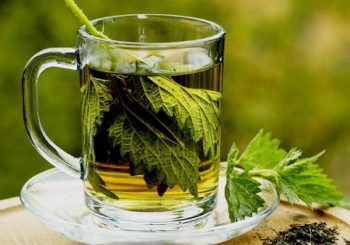Contributing writer for Wake Up World
Often used for garnishing meals and improving flavor, parsley (Petroselinum crispum) is a fragrant green herb with a refreshing taste. Don’t let its simple appearance fool you, though, as it’s a powerhouse of various vitamins and minerals.1,2
There are many ways to consume parsley, as it can be a colorful addition to salads, soups, sauces and sandwiches. But did you know that you can brew parsley into a soothing and therapeutic cup of tea as well? Read on to learn more about parsley tea, its benefits to your well-being and how you can brew a fresh cup on your own.
[pro_ad_display_adzone id=”110028″]
What Is Parsley Tea?
Parsley tea is an herbal infusion made from the fresh or dried leaves of the parsley plant.3 The leaves have a naturally bright, bitter taste,4 which is why sometimes a sweetener is added. Making the tea is quite easy, as there are parsley teabags available at your local supermarket. However, given the affordable price of fresh parsley, it may be a better idea to make your own tea at home.5
Steeping parsley in hot water infuses its compounds into the beverage. This allows you to obtain traces of its plant polyphenols and the following nutrients with every sip of parsley tea:6
- Iron
- Magnesium
- Potassium
- Copper
- Manganese
8 Parsley Tea Benefits
The polyphenols, vitamins and minerals in parsley tea may provide various pharmacological activities, including diuretic, antioxidant, anti-inflammatory and nephroprotective properties, among others.7 All of these nutrients work together to help:
1.Detoxify the body — Because of its natural diuretic property, parsley leaves may help flush out toxins from your body through your urine.8
2.Lower the risk for cancer — Apigenin, one of the flavonoids obtained from parsley tea, has been shown to provide chemoprotective properties.
According to a study published in the Journal of Cancer Prevention, the mechanisms by which apigenin help lower the risk for cancer involve stimulating cancer cell autophagy and apoptosis, regulating cellular response to oxidative stress and DNA damage, suppressing inflammation and angiogenesis, and retarding cancer cell proliferation.9
3.Promote immune health — Parsley tea provides you with vitamin C, which may help improve your immune defenses by supporting cellular immune function, stimulating oxidant-scavenging activity and promoting epithelial barrier function against pathogens.10 Parsley tea also increases your levels of vitamin A, which was dubbed as “the anti-inflammation vitamin” in a 1928 study due to its critical role in enhancing immune function.11
4.Relieve bloating — Parsley is traditionally used to help ease symptoms of bloating. Adjusting eating habits, such as slowing down swallowing, may help bloating as well.12
5.Fight against the effects of free radicals — Parsley tea may be a good source of flavonoids, carotenoids, vitamins and minerals that have antioxidant properties to help defend your cells against harmful free radicals.13
6.Lower the risk for kidney stones — A study published in the American Journal of Clinical and Experimental Urology showed that parsley may help increase urine volume, decrease urinary calcium excretion and raise urine acidity, making it a natural antiurolithiasis remedy.14
7.Promote healthy liver function — A study published in the Journal of Intercultural Ethnopharmacology found that the extract of parsley may have hepatoprotective effects due to its antioxidant properties.15
8.Manage blood pressure levels — Parsley may help lower blood pressure levels by releasing more sodium into your urine and stimulating urination. This decreases the amount of fluid flowing through your blood vessels, which in turn reduces the pressure on your vessel walls.16,17
How to Make Parsley Tea
It’s easy to make a steaming cup of parsley tea. Simply follow this recipe adapted from Verywell Fit:18
Parsley Tea Recipe
Ingredients
- 1/8 to 1/4 cup of fresh parsley leaves
- Filtered water
- Raw honey or stevia, to taste (optional)
Procedure
- Place the leaves into your cup or a tea infuser. A French press is also viable if you have one at home.
- Boil enough water for your chosen container.
- Fill the container with boiling water. Steep the leaves for about four minutes, or longer for a stronger flavor.
- Remove the leaves if the tea was prepared in the cup. Add a dash of raw honey or stevia.
Take a Sip of This Mint-Infused Parsley Tea
You can take your parsley tea up a notch by adding other herbs to it. Here’s a refreshing recipe you can try that incorporates mint leaves:
Mint-Infused Parsley Tea Recipe
Ingredients
- 1/2 cup fresh parsley leaves
- 2 cups of water
- Handful of mint leaves
- Lemon slices
Procedure
- Fill a pot with water and bring it to a boil.
- Put the parsley and mint leaves in a teapot and pour hot water over them.
- Let the leaves steep for five minutes. You can either strain them or leave them in.
- Pour the tea into the cups, add lemon slices and serve.
(Recipe adapted from A Dash of Lemon19)
Parsley Tea Side Effects
Although parsley tea is generally a healthy beverage, you still should consume it in moderation. Drinking large amounts of parsley tea may cause a severe allergic reaction. In a case study published in 2014, a woman developed near-fatal anaphylaxis because she was consuming a cup of parsley every day.20
To stay on the safe side, if you don’t know whether you’re allergic to parsley, consult with a doctor before adding it to your regular diet.
How to Pick Fresh Parsley for Your Tea
If you prefer making parsley tea from scratch instead of buying ready-to-steep teabags from the supermarket, choose plants that look fresh and crisp, with vibrant green leaves. Avoid parsley that has yellowed leaves or other signs of decay.21
Make sure the plant you choose is grown organically to lower your risk of exposure to harmful gardening chemicals. Buy parsley from the local farmers market to guarantee it’s organic, or better yet, grow parsley at home.
Frequently Asked Questions (FAQs) About Parsley Tea
Q: What is parsley tea good for?
A: Parsley tea contains health-promoting polyphenols and nutrients such as apigenin, carotenoids, vitamins A, C and K, folate, magnesium and iron, to name a few.22 It also has numerous pharmacological activities, including antioxidant, anti-inflammatory, diuretic and nephroprotective properties.23
Some of its possible benefits include helping reduce the risk for cancer,24 promoting immune health,25 relieving bloating26 and inhibiting the formation of kidney stones.27
Q: How much parsley tea is safe to drink daily?
A: You can safely drink a cup of parsley tea per day, though you should consult with your doctor to learn if you have any allergies before trying it. Consuming too much parsley may lead to anemia or liver or kidney problems.28
Q: Where can you buy parsley tea?
A: Parsley tea is available in health food stores. You also can make your own using fresh parsley leaves.
Q: Is parsley tea good for your skin?
A: Yes. Parsley may help promote healthy skin, thanks to its vitamin A content, which is essential for skin health.29
Q: Is parsley tea good for your liver?
A: Yes. The extract of parsley present in this beverage has been shown to provide hepatoprotective properties.30
Q: Is parsley tea good for lowering blood pressure?
A: A study showed that parsley has diuretic properties, which may aid in the reduction of blood pressure levels.31
References:
- 1 The Spruce Eats, “All About Parsley”
- 2 J Tradit Chin Med. 2013 Dec;33(6):815-26, Abstract
- 3, 5, 18, 28 Verywell Fit, “Parsley Tea Benefits and Side Effects”
- 4 MasterClass, “What Is Parsley? Learn How to Cook With Parsley”
- 6, 22 USDA National Nutrient Database, Fresh Parsley
- 7 Int J Mol Sci. 2018 Mar; 19(3): 765, 4.4 Parsley
- 8 J Ethnopharmacol. 2002 Mar;79(3):353-7, Abstract
- 9, 24 J Cancer Prev. 2016 Dec; 21(4): 216–226., Abstract
- 10 Nutrients. 2017 Nov 3;9(11)., Abstract
- 11, 25 J Clin Med. 2018 Sep; 7(9): 258., Abstract
- 12, 26 StatPearls, “Meteorism (Tympanites)” Treatment/Management
- 13 Oxid Med Cell Longev. 2016; 2016: 2646840., Abstract
- 14, 27 Am J Clin Exp Urol. 2017; 5(3): 55–62., Abstract
- 15, 30 J Intercult Ethnopharmacol. 2016 Jan-Feb; 5(1): 65–71., Abstract
- 16 Afr J Tradit Complement Altern Med. 2013; 10(2): 292–298., Abstract
- 17 Mayo Clinic, Diuretics
- 19 A Dash of Lemon January 5, 2018
- 20 Med Arch. 2014 Dec; 68(6): 426–427, Abstract
- 21 Harvest to Table, “Parsley: Kitchen Basics”
- 23 Int J Mol Sci. 2018 Mar; 19(3): 765., Abstract
- 29 Community Eye Health. 2013; 26(84): 65, Introduction
- 31 Afr J Tradit Complement Altern Med. 2013; 10(2): 292–298., Discussion
Originally published at mercola.com and reproduced here with permission.
Recommended articles by Dr. Joseph Mercola:
- High Blood Pressure Linked to Increased Risk of Dementia
- Cholesterol Does Not Cause Heart Disease
- CBD Has Unique Ability to Cross Blood-Brain Barrier
- Water and Homeopathy: Latest Discoveries at Science’s Cutting Edge
- Sugar Substitutes: What’s Safe and What’s Not
- Unveiling the Depths of the Human Psyche: Psychedelics May Unlock Parts of the Mind That Are Normally Inaccessible
- What Should Your Poop Look Like?
- The Endocannabinoid System and the Important Role it Plays in Human Health
- Magic Mushrooms May Hold Key to Long-Term Relief from Anxiety and Depression
- Scientific Links Between Processed Foods and Depression
About the author:
Born and raised in the inner city of Chicago, IL, Dr. Joseph Mercola is an osteopathic physician trained in both traditional and natural medicine. Board-certified in family medicine, Dr. Mercola served as the chairman of the family medicine department at St. Alexius Medical Center for five years, and in 2012 was granted fellowship status by the American College of Nutrition (ACN).
While in practice in the late 80s, Dr. Mercola realized the drugs he was prescribing to chronically ill patients were not working. By the early 90s, he began exploring the world of natural medicine, and soon changed the way he practiced medicine.
In 1997 Dr. Mercola founded Mercola.com, which is now routinely among the top 10 health sites on the internet. His passion is to transform the traditional medical paradigm in the United States. “The existing medical establishment is responsible for killing and permanently injuring millions of Americans… You want practical health solutions without the hype, and that’s what I offer.”
Visit Mercola.com for more information, or read Dr. Mercola’s full bio and resumé here.
[pro_ad_display_adzone id=”110027″]








